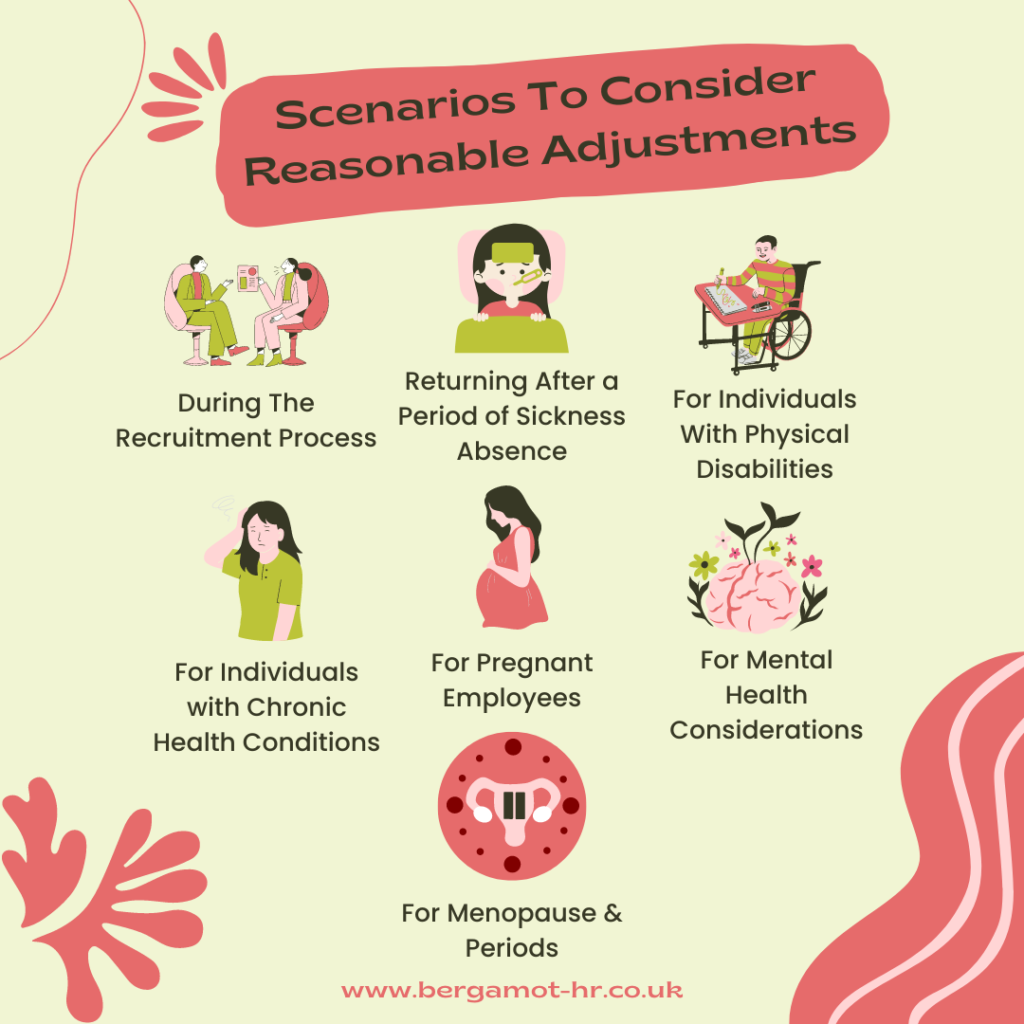
What Are Reasonable Adjustments?
Reasonable Adjustments… what are they? And why would you bother? 🤷♀️
Understanding and implementing reasonable adjustments in the workplace is not just a legal requirement, but a cornerstone of inclusive employment practices.
Reasonable adjustments are modifications or changes made to the work environment or the way things are done to ensure that individuals with disabilities can access and perform their jobs without being at a disadvantage.
Making “reasonable adjustments” to employees’ roles is a legal duty which arises in the Equality Act 2010 with respect to employees who are considered disabled within the meaning of this Act. However, it is not just about adhering to the law. These adjustments not only help individuals to work effectively but also contribute to a diverse and adaptable workforce. Employers benefit from the wide range of perspectives and experiences that come with a diverse team.
Why Would You Make Reasonable Adjustments?
There are many reasons that considering reasonable adjustments is good for your business:
✅ Compliance: Adhering to the Equality Act 2010, which mandates employers to make reasonable adjustments for disabled employees and job applicants.
🫶 Inclusion: Creating a workplace that welcomes diversity and enables all employees to contribute to their fullest potential.
💜 Retention: Supporting employees through their challenges, thereby reducing turnover and retaining valuable talent.
🚀 Productivity: When employees feel supported, they are more likely to be engaged and productive.
It’s important to note that what constitutes a ‘reasonable’ adjustment can vary depending on the size and nature of the employer, the specific needs of the employee, and the cost and practicality of the adjustments. The key is open communication and a willingness to find workable solutions that benefit both the employee and the employer.
Some Of The Scenarios Where You Should Consider Reasonable Adjustments.
SCENARIO
SUGGESTED ADJUSTMENTS & PRACTICES TO CONSIDER
During The Recruitment Process
- Providing application forms in accessible formats.
- Allowing extra time for tests.
- Conducting interviews in accessible locations.
- Offering alternative assessment methods.
Returning From A Period Of Absence
- Implementing a phased return to work.
- Adjusting targets or workload to accommodate a gradual increase in hours.
- Providing additional training or refresher courses.
- Offering flexible working hours or remote work options.
At Work For Individuals With Physical Disabilities
- Installing ramps, lifts, or other accessibility features in the workplace.
- Providing specialised equipment or software.
- Adjusting the layout of the workspace.
- Allowing for regular breaks or a flexible schedule.
At Work For Individuals With Chronic Health Conditions
- Allowing work from home arrangements.
- Modifying duties to reduce physical strain.
- Providing a place to rest during the day.
- Ensuring regular medical appointments can be attended.
At Work For Pregnant Employees
- Adjusting duties to avoid heavy lifting or hazardous tasks.
- Providing more frequent rest breaks.
- Offering flexible working hours to accommodate medical appointments.
- Ensuring access to adequate maternity leave.
For Mental Health Considerations
- Creating a supportive environment to discuss mental health openly.
- Implementing workload management strategies.
- Providing access to mental health resources or counselling services.
- Allowing for mental health days or time off.
For Periods And Menopause
- Develop workplace understanding via training & education
- Factor in regular breaks to help manage symptoms
- Normalise well-being conversations between managers and employees
- Offer flexible working hours
- Allow adjustments to work hours or remote work.

If you want to have a chat about making reasonable adjustments – if you should, if you need to, and how to work out what that might look like in practice, get in touch. We can have a free, no-obligation initial consultation.





